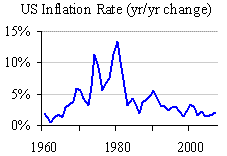Most politicians and most people who work with money and finance do not understand economics and that includes Bernanke.
When I read that I practically fell out of my chair-- because it's true!
Your post was so chock full of good stuff I printed the whole thing out and tacked it on the bulletin board next to my desk for reference, but your last sentence was hard for me to follow. What I hear you saying is that since '99 we've been having inflation that we didn't before and W's made it permanent.
Just which inflation are you talking about?
Reagan put an end to the Carter inflation and commenced a mild deflation. In the period up to 2000 the value of the dollar actually increased slowly. There was much Democrat complaint about "wage stagnation" because wages were not rising nominally over that period and it was a noisy issue among Democrats who decried it as evidence of the "worst economyin 50 years." But people were more ore less comfortable because their dollars stretched just a little farther as time passed. It was a long period of labor peace as unions felt no economic pressure to go on strike. In 1999 Clinton's FED began a policy of inflation, adding money to the money supply in excess of the needs of the market. Bush made that official when he announced "devaluation" of the dollar to counter perceived Chinese money manipulation. The rate of inflation was increased and the dollar has been losing value since, at a rate in excess of 10%.
The repeated raising of the interest rate by the FED to "stave off" inflation is, in fact, a ploy to attempt to channel the inflation into an area, interest rates, that the consumers won't notice. Ha! It has dealt a blow to one of the visible results of the inflation- it has ended, finally, the real estate price rise which now will direct that money that isn't chasing houses back into the rest of the market.
The European and Asian central banks, especially China, have been buying up most of those excess dollars to maintain the value of their currency reserves that back the value of their own currencies. Eventually that has to stop because they are spending value in order to keep the value of their dollar reserves stable. They have more and more dollars but no more value. They are now beginning to "sell off" those dollars and consumer prices are beginning to jump in the USA, at least in my neighborhood they are. Those dollars being sold off now, after years long delay, are entering the market and competing for goods. The portion of the current inflation that was not sucked up by the foreign banks has had a pretty strong and visible effect. Commodities have risen steadily in nominal price. Housing has steadily increased until the last year when the FED's interest rate hikes finally throttled the rise. And energy, most visibly oil, well that has beeen prettynoticeable, no? If these price rises had occurred with no inflation, other prices generally would have declined, but, except for electronics, they have not.
Most of the time our government economists have been Keynesians and/or Monetarists. Both varieties believe in manipulation of the money to achieve desirable ends. The monetarists think they have to tweak and adjust in order to maintain a stable dollar or to counter foreign governments' tweaking and adjusting. Keynesians tweak and adjust for political ends as well and to "counter" business cycle trends. In truth if a stable currency is rigidly maintained the ups and downs of the business cycly will be minimized- largely smoothed out because economic calculation is fairly easy with stable money. Businesses don't have to continually compensate for changes in the value of the unit of account.
The only proper response to foreign money manipulation is a stable dollar. Governments that manipulate their currencies harm their economies no matter what ploys are essayed and an economy with stable money will benefit relatively from other countries' manipulations, no matter what the immediate situation seems to be because that manipulation reduces economic efficiency(adds costs) for those producers that must operate with the manipulated money.
P.S. The inflation rate illustrated on that chart is the price level. Generally that mirrors the actual inflation rate pretty well but, because it does not measure inflation directly, it is deceptive. The inflation of the dollar is, by definition, the excess dollars put into the market over the amount required to keep the dollar stable. If those dollars are then bought up by the various central banks and held then a price level chart will not reflect them. That has been the case since 2001. A money inflation chart will not usually be characterized by bumps and dips because governments tend to inflate or deflate at steady rates. Prices of goods, however, are immediately affected by many things in the markets. The total picture of market prices would also show a smooth curve but people who make charts only measure some prices. Our government calls it a "basket of goods and services" and while that is generally representative, it does not account for all the influences in the market that shift the available dollars from one thing to another.